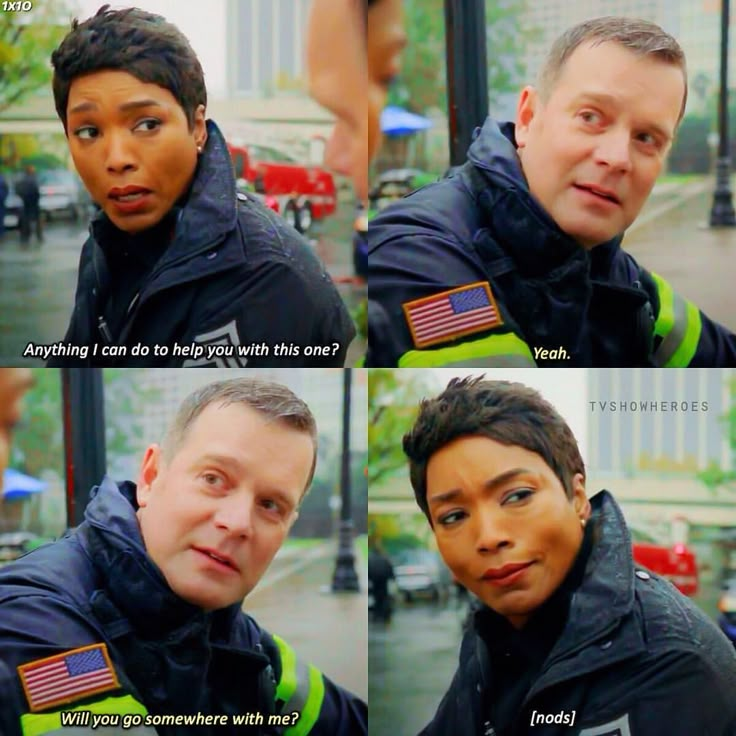
Buck can’t revert to the person he was prior to Bobby’s death. Although viewers should definitely expect a bit of backsliding, especially when it comes to Buck’s love life and romantic partners, the end result of killing off a significant character has to alter the loved ones that they leave behind. There are examples of this, from some of the most beloved television dramas, that 9-1-1 would do well to follow.
The death of Buffy’s mom, Joyce Summers, in Buffy the Vampire Slayer is arguably the inciting incident that led the seminal genre show to embrace a darker tone in season 6. The death of Logan Roy in Succession, likewise, casts a shadow over everything that happens next. Stark is right to hope that Bobby’s death will have a transformative impact on Buck. Arguably more so than anyone else, with the obvious exception of Athena, Buck carries Bobby’s loss with him. The procedural never overplays the father-son dynamic between the two men. Still, for those who have followed the 118 for the past eight years, especially knowing Buck’s distant relationship with his parents, the void left by Bobby is not one that he could ever feel. But he could go from the experience. 9-1-1 could grow as well by retiring some of Buck’s old tendencies.
If you’ve been riding the emotional rollercoaster that is 9-1-1, then you already know that Evan “Buck” Buckley has been the show’s lovable wildcard since Day 1. But in recent seasons, something unexpected has happened—Buck has matured, and it’s turning out to be exactly what the show needed. Let’s break down why this evolution has been long overdue and how it’s reshaping the heartbeat of the series.
Why Buck’s Growth Hits So Hard
A Reckless Start With A Hidden Depth
Buck’s early seasons? Pure chaos. From climbing buildings shirtless to bouncing between flings, he was the firehouse’s adrenaline junkie. But underneath that devil-may-care attitude was a guy craving connection, purpose, and—let’s be honest—a sense of self.
The Emotional Layer We Didn’t See Coming
It wasn’t just about the stunts. Buck slowly started revealing a more vulnerable side—wrestling with abandonment, identity, and mortality. Suddenly, he wasn’t just the comic relief. He was real.
Psychological Growth = Better Storytelling
The Therapy Arc That Changed Everything
Remember Buck’s sessions with Dr. Copeland? Those weren’t just filler scenes. They peeled back layers of trauma and confusion, showing us a man learning to heal. That inner work is what sparked his evolution.
Responsibility Looks Good on Buck
We’ve seen him step up—not just in rescues but in relationships. From co-parenting baby Jee-Yun with Chim and Maddie to being the rock his friends lean on, this new Buck is dependable—a word no one would’ve used for him before.
Why This Change Was Long Overdue
The Party Boy Routine Was Getting Old
Let’s be real—early Buck was fun, but unsustainable. His immaturity would’ve eventually made him irrelevant or annoying. This shift gave him new life.
He’s No Longer Just “The Hot One”
Growth made Buck interesting. He’s no longer just eye candy or the guy who messes up but somehow charms his way out. Now he owns his space in the narrative.
Buck’s Maturity Makes the Whole Team Stronger
More Trust, More Teamwork
When Buck became reliable, the team dynamic shifted. Trust deepened. The stakes feel higher, and so does the payoff when he comes through.
Mentor Vibes Incoming
Who would’ve guessed Buck could be a mentor? Now, he’s stepping into that big brother role, especially with newer recruits and junior team members.
Buck’s Growth Complements Other Arcs
Maddie and Chim’s Journey
His growth mirrors—and supports—Maddie and Chimney’s own struggles with parenthood and healing. He’s not a side character anymore; he’s woven into every emotional thread.
Athena and Bobby’s Influence
Buck’s maturity didn’t happen in a vacuum. The grounding energy of Bobby and the firm compassion of Athena helped guide him. He’s been shaped by family, even the kind that isn’t blood.
Struggles That Fueled His Transformation
The Death That Shook Him
His brother Daniel’s story? Devastating. But it forced Buck to confront what he’d been running from—his place in the world and in his family’s past.
The Coma Twist
That near-death experience gave Buck a front-row seat to his own vulnerabilities. You can’t play hero if you’re broken inside. That lesson stuck.
The Long Road Makes It Worth It
Slow Burns Are the Best Burns
This wasn’t an overnight flip. It’s been seasons in the making—and that’s what makes it powerful. We’ve grown with Buck, and that’s why it hits so deep.
Fans Are Finally Getting Closure
From relationship disasters to family revelations, Buck’s been through it all. Now we’re finally seeing him own his narrative instead of being a victim of it.
Why Buck’s Change Is a Win for 9-1-1
Stronger Drama, Deeper Payoffs
The stakes feel higher now that Buck has something to lose—his hard-won peace, his role on the team, his emotional progress. That’s good drama.
Broader Emotional Range
Mature Buck can still crack jokes and light up a scene—but now, his emotional range adds real weight to the show’s most intense moments.
What This Means for 9-1-1’s Future
A Shift Toward More Character-Driven Stories
The show’s always been about more than emergencies. Buck’s growth proves that audiences crave emotional arcs just as much as burning buildings.
Room For Redemption & Relatability
Buck’s not perfect—and that’s the point. His flaws make his journey relatable. Viewers see parts of themselves in his mistakes and in his growth.

Is Buck Done Growing? Not Even Close
Just because he’s maturing doesn’t mean he’s static. There’s still room for romance, family exploration, and leadership development. This is just the beginning of “Buck 2.0.”
Final Thoughts: Buck’s Growth Is the Heartbeat of 9-1-1
When a character evolves as naturally and powerfully as Buck has, it elevates the entire show. He went from being the reckless rookie to a layered, compelling force of emotional gravity. And honestly? It’s the best change 9-1-1 has made in years.
This isn’t just character development—it’s character redemption. And it proves that even in a show packed with fireballs and sirens, the real explosions happen in the heart.